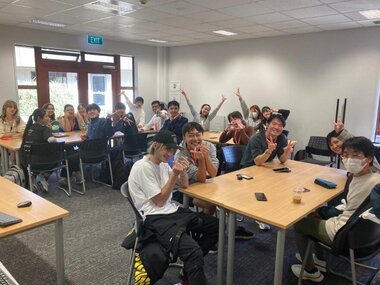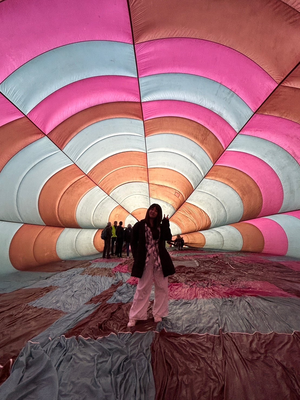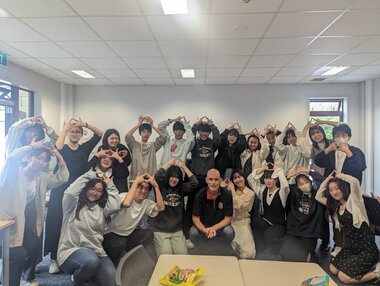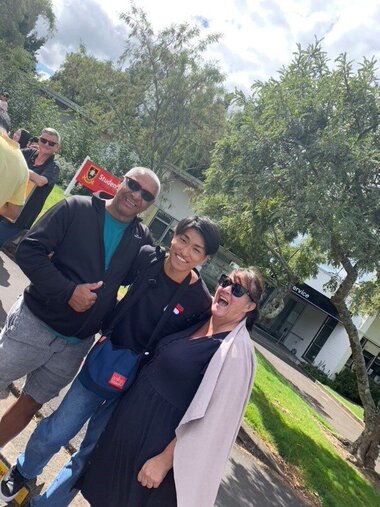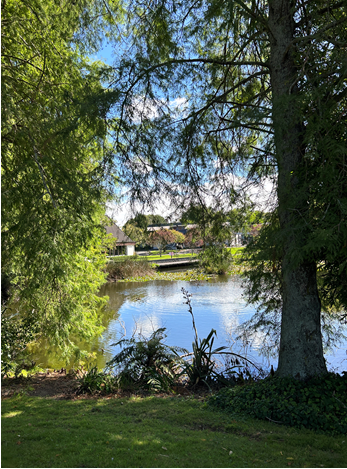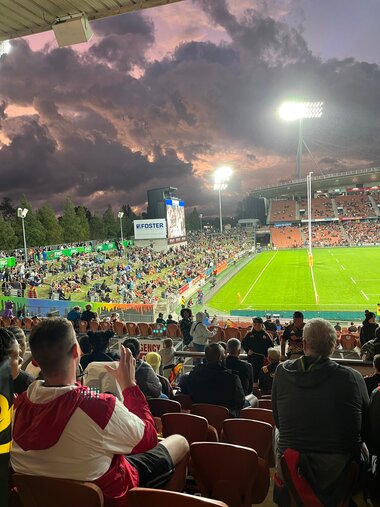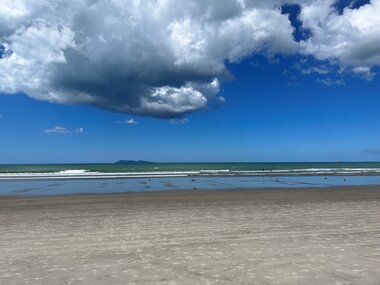Nine University of Aizu (UoA) students had three weeks of short-term Oversea Programs at the University of Waikato in Hamilton, New Zealand.
Here are their reports of their classes and daily life in New Zealand.
<Participants>
Study Reports>
1. Mr. MATSUDA Ryo (a third-year student)
There are two main reasons why I decided to join this program. One of them is to test my English skills. The other is to see for myself how overseas countries have changed because of the coronavirus.
First, about coronavirus. Before going to New Zealand, I could not obtain any information other than that the wearing of masks continues to be recommended. However, after arriving there, we saw very few people wear masks. It was a little surprise for me because I had an image that the country had a strict policy against coronavirus.
School classes are divided into two levels of difficulty, and I entered the pre-intermediate class. In this class, we learned many topics in English, and we sometimes learned British and New Zealand English words through some games. I discovered something every day in each class, and every class was exciting for me. At school, many Japanese students came from different universities, so we were able to deepen our friendships.
On holidays, I often went out into Hamilton and the suburbs. On the first weekend, I went to Hamilton Garden, Waitomo caves, and Hobbiton. And on the second weekend, I went to Rotorua. Each holiday, I enjoyed very beautiful sights, and all experiences were amazing.
One of the interesting things in New Zealand is sports. During our program, most Japanese people are excited about World Baseball Classic, but in New Zealand, no one watched the games. Instead of baseball, I watched rugby at Waikato Stadium. That was my first experience watching a rugby game, so I was very excited. I also watched cricket and netball during the program, and both sports are interesting. It was a good experience for me to feel the culture of a different country through sports.
The most difficult thing I felt in this program is "British English". In Japan, almost all Japanese students learn American English, but in New Zealand, people usually use British English. During the homestay, I had a little difficulty communicating with them because I could not understand some of the words they used daily. At first, I took time to get used to the rules of homestay, but after a week I was comfortable with them.
What I learned through this program is the importance of being active. If I don't make action, nothing will happen. Communicating with host families and people in the university, to make my plans for the weekend... everything. I want to use the experience I gained from this program for the rest of my life.

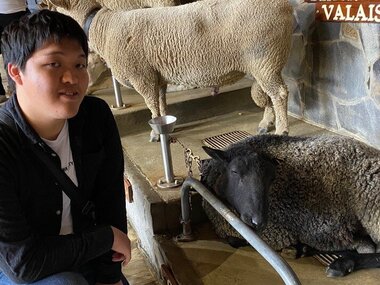
2. Ms. OSHIYAMA Rin (a third-year student)
Reflections on Study Abroad.
I was able to go on the study abroad program that I had always dreamed of, had a homestay, and met and discovered many things. I was really happy during these three weeks.
The following is a summary of my realizations during my study abroad.
First, family time makes me feel very happy. My best memories of my study abroad experience are the times I spent with my host family. We went to the park, went biking, had barbecues, etc. I was very happy. What classes I had today, what I did for fun, and the evening meals we had while reflecting on the day were delicious even abroad.
Second, although I could not speak good English, I was able to communicate with them. (Maybe it was because my host family spoke slowly in easy-to-understand English.) I am not good at studying English, but I think I was able to do what I wanted to do, ask for help, and ask questions. I learned that the important thing is to make an effort to be understood and to show an attitude of trying to understand.
Third, I learned about who I am and what kind of country Japan is. As I met many new people, I talked a lot about what I like and why I came here. I talked a lot about myself and Japan. It made me think a lot about who I am and what kind of country Japan is. Their impressions of Japan were all positive, which made me proud to be Japanese. However, there were also negative relationships between Japan and other countries that I did not know about. I learned to accept what I did not know and to treat people with sincerity.
Fourth, I learned that living life with margins will save me. Mornings in New Zealand are very early; people start heading to work at 6:00 a.m. and stores start closing at 4:00 p.m. They say this is because they use their evenings to rest. When I was in Japan, I did my part-time job to the bone during the hours when I didn't have class. After spending three weeks without a part-time job for the first time in a while, I realized how important it is for me to have time to myself. I woke up early in the morning, prepared myself properly, spent the day, ate dinner together, and went to bed early. I thought it is good for me to use my time carefully in this way.
Finally, this study abroad program was very expensive, even if I had received a scholarship. Even so, I am truly glad that I went. I met a lot of people and made a lot of discoveries. I will never forget these three weeks. I am grateful to the teachers who planned the program, my parents who supported me, and the many encounters and discoveries I made. Thank you very much.
3. Ms. KAGEYAMA Kaho (a second-year student)
During my three weeks of study abroad, my motivation for my English has grown. There were three things that left a lasting impression on me.
First, I felt my English ability was not good enough. I often lost confidence because I could not communicate what I wanted to ask and could not understand the answers I got back. However, when I was able to convey what I wanted to say to the other person or understand what the other person wanted to say, I felt very happy. From this experience, I felt that I wanted to improve my listening and vocabulary skills, and I decided to continue studying English after returning to Japan.
Second, I was able to enjoy daily conversation in English. During the first week, I was so nervous that I could not talk to my host family by myself. However, thanks to my host family asking me what happened today, I gradually became less nervous and was able to speak to them on my own. Thanks to the daily conversations with my host family, I think I improved my daily conversation skills.
Third, I was able to realize the growth of my English ability. During the three weeks of university classes, the main part of the program was conversation in English. Therefore, I was able to experience all aspects of speaking, listening, and seeing English every day, and although I could not speak well at first, I felt that my ability to interact in English had indeed improved. In particular, I felt that my listening skills, which I was not very good at, became better than before in conversations with the teachers.
I think that these three weeks were a valuable experience for me to dive into an environment where English is the only language that I can speak, which is not possible in Japan. Also, I think the most significant growth was that I was able to change my mindset from "I have to" to "I want to" when it comes to studying English.
4. Mr. NOHARA Kaiki (a second-year student)
For me, to communicate in English needs some processes: Choosing words, construct sentences, check grammar, speak, and listen. By this program, I realized that "choosing words", "speak", and "listen" are the most important part because they natives understand English very well, so we don't need to treat perfect English. However, to enjoy communication needs to prepare vocabulary, idioms, slang and so on so you should do that. Also, you should treat right pronunciation because our cheap English isn't understood sometimes by this problem. Like this, you should prepare to listen because their English is fast. In addition, too asking makes them irritate maybe so you should prepare searching in google and your opinions. By thinking them at least, I got to be able to dairy communication in English probably. I felt it's interesting. In addition to these, I talked English speakers many times especially in lesson and home. So I realized my many mistakes in pronunciation, lack of vocabulary and listening skills. In Japan class, we are needed to talk with students each other but this is boring and make us anxious because we needed speakers know correct English. Above all, this program was really interesting opportunity for me.
About something new about English culture or language that I learned for the first time, there were many people with bare feet. My host father is also walking with it. I respect it and try but I was injured so I don't recommend it. This reason is there are many hard floor houses, I thought. Maybe for them, bare feet and putting shoes are almost same thing. Next, all stuffs are so big. Dish washer, fridge, laundry, toaster is bigger than mine so I was surprised. Also, foods selling in supermarkets are big. But my host go shopping once per week, so it suits for them. I love much banana because it is very cheap and delicious!
5. Mr. URUSHIDA Akira (a second-year student)
Through this study abroad program, I feel I got a little bit more confident to speak English compared to what I used to. I found my weak points as well. I think there were some reasons for this. From my perspective, one of the biggest factors was that I was forced to interview some students of the University of Waikato about specific topics in the classes. This helped me expose myself to real English conversations. However, I had sometimes trouble communicating with them because of my English pronunciation and lack of clarity in what I said. Also, I occasionally had difficulty understanding what they said because they spoke so fast and had a variety of accents. Although I experienced a lot of troubles, I endeavor to communicate with them and to understand them, and I gradually and unconsciously got used to it.
While I was talking with local students, I found myself not good at explaining something in detail. I guess this may be the reason for the lack of clarity in what I say. I'm still not able to describe what I think precisely because, I think, of poor vocabulary and a lack of English conversation experiences. I think I have the grammatical knowledge of explaining something specifically because I can use relative pronouns and other grammar in writing. Hence, I need to find a way to make use of the knowledge for real English conversation. Moreover, it's necessary to expand my vocabulary. I think there's no way other than consciously practicing using what I learned. I'll continue to practice speaking English even after this program to overcome my weakness.
6. Mr. MOCHIDA Haruki (a second-year student)
Homestay in New Zealand was a great opportunity to learn about the customs of the country, including food habits, culture, and manners that are different from those in Japan. I was impressed by the hours of sleep in New Zealand, where people go to bed at 9 or 10 p.m. and wake up at 5 or 6 a.m. the next morning. New Zealand is known as one of the happiest countries in the world, so I thought there might be a connection with the amount of sleep they get.
In class, we did a lot of activities that basically focused on speaking, and I became somewhat confident in my speaking after my study abroad. At the University of Waikato, there are many opportunities to speak with local volunteer students in English, and I felt that the confidence I gained by conversing with them in real life was tremendous.
After school, I was usually not at home, but I was able to participate in club activities, go shopping with friends, and visit tourist spots. On holidays, my friend's host mother was acquainted with the tour staff, so we were able to join the tours.
I experienced a very intense 3 weeks in New Zealand and learned a lot. I felt once again that it was a good thing that I went.
The most important thing is to be proactive. Not only the conversation in class, but also the attitude to act and learn by oneself in all things will remain as one's own experience value as long as one works hard. I am going to take the initiative to improve my English even more from now on.
7. Ms. ADACHI Fuka (a first-year student)
Class is a one of the interesting things for me.
In the class, we studied vocabulary, grammar, phrases and so on. I feel that reading activity is most frequently done in Japan. But in New Zealand, we had many conversation activities. We had classes for about 4 hours and half except Friday. Maybe we always had conversation for 3 hours. While activity, there was a theme. For example, health, fashion, food, travel and so on. It was so fun. I could know many ideas from other students. And at the same time, it was challenging for me. I don't have enough English skill to explain my thought. Sometimes I couldn't tell it perfectly. But I tried to managed to speak as much as I can.
As a conversation activity, we had an interview to original Waikato students. My teacher said that the purpose of that activity was make us a confidence of our English skill. Actually, I'm not good at talking to others. So, at beginning of this interview, I became nervous. But, every time I could talk to someone, I could have confidence gradually. So I thanked to my teacher.
Through the class, I learned a difficulty of telling my thought properly in English and enjoyment of talk with many people.
And I want to write about culture in New Zealand. When I first see the street at there, I really surprised the amount of people who go outside. Especially children. Many people play sports in park and walk along everywhere. I can't see this scene in Aizu. I really like it. I talked this my host father, he said, "Kiwi (people grew up in New Zealand) really like to go outside. We do everything outside." Also, many students eat lunch in outside in university. And I heard most of children take part in some sports club team in New Zealand. For example, rugby, cricket, and hockey. So, I understand it doesn't include all people, but I think people in New Zealand make a custom to go outside since they were child.
Through this program, I could experience many precious things and meet many people. I want to improve my English skill and not only it, but also I want to grow my mind from now on.
8. Ms. SATO Chihiro (a first-year student)
I went to New Zealand for three weeks. And I learned A lot of things and also experienced there. This is about NZ's culture below.
First, I went to the rugby game with my friends. There was a lot of people in the huge stadium. I was really excited to watch the game. All of the player were so cool. And also the audience was cheering hard and it was very fun. They came to cheer for it even though it was a weekday. Rugby is well known and popular that it is considered New Zealand's national sport. My host mother told me that all kiwi love rugby. The NZ'snational team that called All Blacks is especially popular, and I saw many goods in souvenir shops. After returning to Japan, I checked and found that they were still out of stock and difficult to obtain through online shopping.
Also, I saw many Maori. They have tattoos on a part of their body, which is said to be a symbol of their clan. Before I came toNZ's, I thought that Maori people were special and that I would have to go to see them, but I saw a wide range of people, from young to old, at the university and in a nearby shopping mall.
Next topic is NZ's nature.
Even in the city of Hamilton, we can always feel nature. First of all, I have to say that the trees are very big. Even the trees growing around the university were quite different in size from those in Japan. My host father told me that this is because the trees have been around for a very long time. Even some of the trees growing on the roadside are over 70 years old. I was very surprised.
I also have special memories of Waihi Beach. I had not been to the ocean almost as long as I can remember. So this was the first time I saw it with my own eyes. It was vast and calm, and I felt nostalgia and warmth. My friend's host family took us there and we ate fish and chips together.
The last topic is about my schooldays.
At the university, all of classes focused on group work. To practice speaking in English, I spoke to native speakers on campus and asked them to help me with an interview. At first it took a lot of courage to talk to them, but they tried their best to understand my English and answered my questions. From the middle of the class, I enjoyed talking to them so much that I was engaged in the activity until the very end of the class.
9. Mr. MURAKAMI Ayato (a first-year student)
I had a lot of things that I learned in this program. I'd like to write why I decided to join this program and impressive two topics.
There is one thing I want to join this program. I'm interested in different culture from mine, for example food, language, personal character, how to think, etc.. To be honest, I can improve my English skill even in Japan, but I thought I cannot actually eat local food, find difference of weather and see view not picture but in person. So, I decided to join this program that I can find difference of culture from me by spending my time except for Japan and staying with host family.
First topic is I had impression is how to spend time of free time. The most impressive thing is time my host family's going to bed. First of all, NZ's climate is pretty different from Japan. In NZ, I can see Sun and it's bright even if it's 7 o'clock. And then After sunset, it get dark soon. In short, time when it get dark in NZ is so late in comparison with Japan. But host family's going to bed time is too early for me. It's about 10 o'clock. I'm interested in this difference. That's why many shop close early, I thought. Also, I feel that time that NZ's people use smartphone is shorter than Japanese guys. I like its habit. My host family often do exercise and cooking. In particular, my host mother tell me that she often go for cycling. In addition, my English also teacher was like "I go hiking once at least one week" I thought that it is common to spend their time to do some activity.
Second topic I had impression is difference of view between NZ and Japan. For three weeks is too short time for me. But I was able to be off to a lot of place of NZ such as Witomo caves, Hobbiton, Hamilton garden, Taupo, Wikato lake etc... In all of those, I thought NZ's view and nature is awesome. I felt that high of NZ's sky is higher than Japan and there are a lot of nature even if big city. So, I enjoy just only walking to uni because NZ's view is nice even anywhere. Especially, Taupo's view touched me so much. Taupo is beautiful lake and have Fuka falls. Color of water is beautiful emerald green and it was too nice to explain it well. Also, I could some activities and it was really exciting for me. If you come to NZ, I recommend you to go to Taupo and do some activity. But it takes pretty much money to do these.
Finally, I'd like to say what I think in studying abroad. Taking an action actually is very important, because I mind my English level and cost of studying abroad but I never regret to join this program. I thought I'd like to be global person. So I want to study English and foreign culture.

